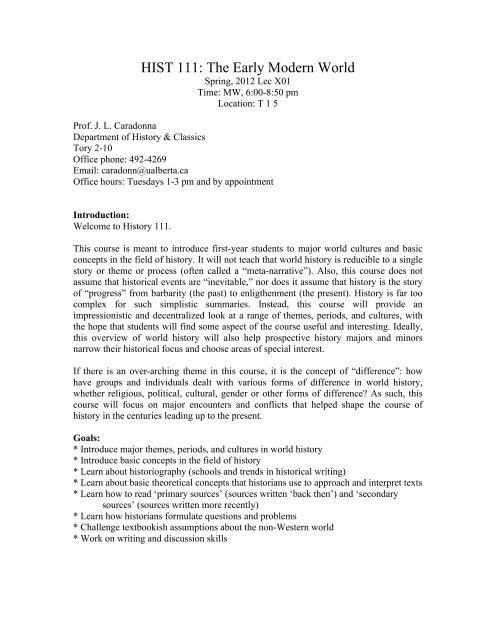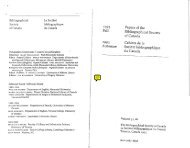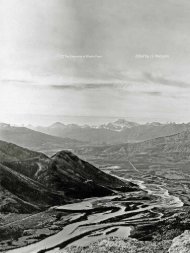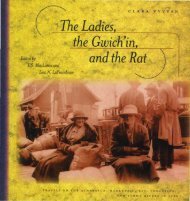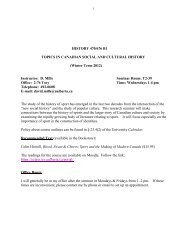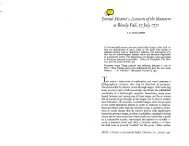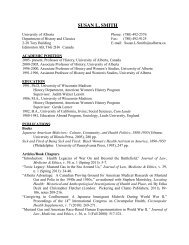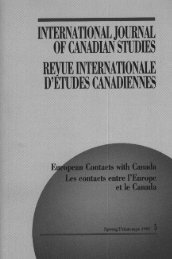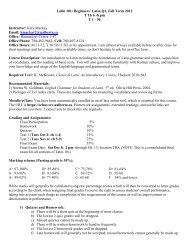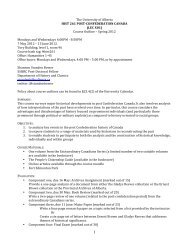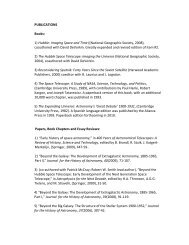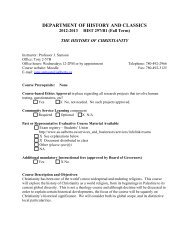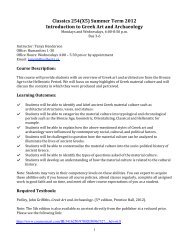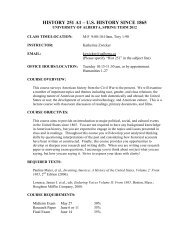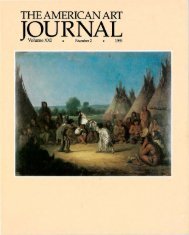Hist 111 Syllabus (spring) - History and Classics, Department of
Hist 111 Syllabus (spring) - History and Classics, Department of
Hist 111 Syllabus (spring) - History and Classics, Department of
You also want an ePaper? Increase the reach of your titles
YUMPU automatically turns print PDFs into web optimized ePapers that Google loves.
HIST <strong>111</strong>: The Early Modern World<br />
Spring, 2012 Lec X01<br />
Time: MW, 6:00-8:50 pm<br />
Location: T 1 5<br />
Pr<strong>of</strong>. J. L. Caradonna<br />
<strong>Department</strong> <strong>of</strong> <strong>Hist</strong>ory & <strong>Classics</strong><br />
Tory 2-10<br />
Office phone: 492-4269<br />
Email: caradonn@ualberta.ca<br />
Office hours: Tuesdays 1-3 pm <strong>and</strong> by appointment<br />
Introduction:<br />
Welcome to <strong>Hist</strong>ory <strong>111</strong>.<br />
This course is meant to introduce first-year students to major world cultures <strong>and</strong> basic<br />
concepts in the field <strong>of</strong> history. It will not teach that world history is reducible to a single<br />
story or theme or process (<strong>of</strong>ten called a “meta-narrative”). Also, this course does not<br />
assume that historical events are “inevitable,” nor does it assume that history is the story<br />
<strong>of</strong> “progress” from barbarity (the past) to enligthenment (the present). <strong>Hist</strong>ory is far too<br />
complex for such simplistic summaries. Instead, this course will provide an<br />
impressionistic <strong>and</strong> decentralized look at a range <strong>of</strong> themes, periods, <strong>and</strong> cultures, with<br />
the hope that students will find some aspect <strong>of</strong> the course useful <strong>and</strong> interesting. Ideally,<br />
this overview <strong>of</strong> world history will also help prospective history majors <strong>and</strong> minors<br />
narrow their historical focus <strong>and</strong> choose areas <strong>of</strong> special interest.<br />
If there is an over-arching theme in this course, it is the concept <strong>of</strong> “difference”: how<br />
have groups <strong>and</strong> individuals dealt with various forms <strong>of</strong> difference in world history,<br />
whether religious, political, cultural, gender or other forms <strong>of</strong> difference? As such, this<br />
course will focus on major encounters <strong>and</strong> conflicts that helped shape the course <strong>of</strong><br />
history in the centuries leading up to the present.<br />
Goals:<br />
* Introduce major themes, periods, <strong>and</strong> cultures in world history<br />
* Introduce basic concepts in the field <strong>of</strong> history<br />
* Learn about historiography (schools <strong>and</strong> trends in historical writing)<br />
* Learn about basic theoretical concepts that historians use to approach <strong>and</strong> interpret texts<br />
* Learn how to read ‘primary sources’ (sources written ‘back then’) <strong>and</strong> ‘secondary<br />
sources’ (sources written more recently)<br />
* Learn how historians formulate questions <strong>and</strong> problems<br />
* Challenge textbookish assumptions about the non-Western world<br />
* Work on writing <strong>and</strong> discussion skills
Format<br />
Since this course is likely to be fairly small, given that it’s the <strong>spring</strong> semester, this<br />
iteration <strong>of</strong> <strong>Hist</strong>ory <strong>111</strong> will mix lecture <strong>and</strong> discussion. Most meetings will involve some<br />
lecturing, which will contextualize the readings or introduce a particular theoretical<br />
concept. Discussion will be part <strong>of</strong> most if not every class meeting, which means that<br />
there will be a participation grade for the course.<br />
Examinations:<br />
There will be three exams in this course: a first exam, a second exam, <strong>and</strong> a third exam.<br />
The format will be essay questions. Any <strong>and</strong> all subjects covered in this course, both in<br />
the readings <strong>and</strong> in the lectures, could appear on the tests. Be prepared. Do all the<br />
readings <strong>and</strong> attend all the lectures. And take good notes!<br />
Marking:<br />
Participation 20%<br />
First exam: 25%<br />
Second exam: 25%<br />
Final exam: 30%<br />
Grade break down<br />
A: 94-100<br />
A-: 90-93<br />
B+: 87-89<br />
B: 84-86<br />
B-: 80-83<br />
C+: 77-79<br />
C: 74-76<br />
C-: 70-73<br />
D+: 67-69<br />
D: 64-66<br />
D-: 60-63<br />
F: 59 <strong>and</strong> below<br />
Please note:<br />
Students who require accommodations in this course due to a disability affecting<br />
mobility, vision, hearing, learning or mental or physical health are advised to discuss<br />
their needs with Specialized Support <strong>and</strong> Disability Services, 2-800 Students' Union<br />
Building, 492-3381 (phone) or 492-7269 (TTY).<br />
Students whose writing skills are not adequate for university-level work are advised to<br />
seek help immediately from the Effective Writing Resources programme in the Academic<br />
Support Centre (492-2682). The letters "EWR" on any assignment constitute a strong<br />
suggestion that you need help in this area.
Plagiarism (copying without giving credit), even <strong>of</strong> one sentence or paragraph, is grounds<br />
for action against a student <strong>and</strong> can lead to expulsion from the university. Be very careful<br />
<strong>of</strong> what you use <strong>and</strong> how you use it, esp. material from websites. It is your responsibility<br />
to review the rules regarding plagiarism in the Calendar; see also the regulations at<br />
http://www.u<strong>of</strong>aweb.ualberta.ca/governance/studentappeals.cfm<br />
Students are expected to attend every class <strong>and</strong> participate in all discussions. Planned<br />
absences should be announced to the instructor in advance. Absences due to illness must<br />
be justified by a physician’s note to avoid a mark penalty. Students are responsible for<br />
material covered in classes which they miss, for whatever reason. Assignments h<strong>and</strong>ed in<br />
late shall be assessed a late penalty <strong>of</strong> 5% per day. Assignments should be typed <strong>and</strong> use<br />
the st<strong>and</strong>ard essay style detailed in the pamphlet “Writing <strong>Hist</strong>ory Essays”, which is<br />
available from the main <strong>of</strong>fice, <strong>Department</strong> <strong>of</strong> <strong>Hist</strong>ory <strong>and</strong> <strong>Classics</strong> (Tory 2-28). All<br />
assignments must include on the last page a list <strong>of</strong> works cited. Spelling, grammar <strong>and</strong><br />
style all count <strong>and</strong> marks shall be deducted for egregious errors. Very badly written<br />
papers shall be h<strong>and</strong>ed back unmarked for revision without late penalties. We will not<br />
mark or print out assignments that are only e-mailed to us, except in extraordinary<br />
circumstances.<br />
Readings:<br />
• Texts on Moodle (Go to homepage <strong>of</strong> history <strong>and</strong> classics. Use CCID <strong>and</strong> your<br />
pasword)<br />
• David Herlihy, The Black Death <strong>and</strong> the Transformation <strong>of</strong> the West<br />
• Erasmus & Luther, Discourse on Free Will<br />
Located on Moodle 1 :<br />
• Discovering the Global Past<br />
• The Human Record<br />
• Las Casas, Conquest <strong>of</strong> the Two Indies<br />
• Primary Source Reader for World <strong>Hist</strong>ory<br />
• Said, Orientalism<br />
• Olaudah Equiano, The Interesting Narrative <strong>of</strong> the Life <strong>of</strong> Olaudah Equiano<br />
• Vincent Carretta, “Olaudah Equiano or Gustavus Vassa? New Light on an<br />
Eighteenth-century Question <strong>of</strong> Identity.”<br />
• Jonathan I. Israel’s European Jewry in the Age <strong>of</strong> Mercantilism, 1550-1750<br />
• Thomas More, Utopia<br />
• Plymouth Colony legal proceedings<br />
• Saint-Simon’s Memoirs<br />
1 Moodle is an online program that allows pr<strong>of</strong>essors to post documents to the web <strong>and</strong> communicate<br />
electronically with students. To access the moodle for this course, go to the homepage <strong>of</strong> the <strong>Department</strong> <strong>of</strong><br />
<strong>Hist</strong>ory <strong>and</strong> <strong>Classics</strong> <strong>and</strong> click on “moodle.” The password for our course (<strong>Hist</strong> <strong>111</strong>) is the word<br />
“worldhistory” (no quotation marks). Further details in class.
• Glückel <strong>of</strong> Hameln’s Memoirs<br />
• Louis XIV, Memoirs<br />
• Joan W. Scott, “Gender: A Useful Category <strong>of</strong> <strong>Hist</strong>orical Analysis”<br />
• Jean-Jacques Rousseau, “Discourse on Inequality”<br />
• Documents from the French Revolution<br />
• Olive Dickason, Canada’s First Nations<br />
• Virginia Slave Laws<br />
Recommended <strong>and</strong> Optional Material:<br />
• Keith Jenkins, Rethinking <strong>Hist</strong>ory<br />
• John H. Arnold, <strong>Hist</strong>ory: A Very Short Introduction<br />
• Alfred Andrea <strong>and</strong> James Overfield, The Human Record: Sources <strong>of</strong> Global<br />
<strong>Hist</strong>ory<br />
• Anna Green <strong>and</strong> Kathleen Troup, The Houses <strong>of</strong> <strong>Hist</strong>ory<br />
• World <strong>Hist</strong>ory, Compact Fourth Edition (Upshur, Terry, Holoka, G<strong>of</strong>f, Cassar)<br />
May 7<br />
Introduction to the Course<br />
The Problem <strong>of</strong> World <strong>Hist</strong>ory<br />
Discussion <strong>of</strong> Hayden White <strong>and</strong> Narrative<br />
François Lyotard on “Metanarratives”<br />
Introduction to <strong>Hist</strong>oriography <strong>and</strong> <strong>Hist</strong>ory as a Method<br />
Key Terms for <strong>Hist</strong>orians<br />
May 9<br />
Village life in the Middle Ages, Feudalism, <strong>and</strong> the World <strong>of</strong> the Peasantry.<br />
Recommended Readings:<br />
1) Discovering the Global Past, pp.1-33<br />
2) The Human Record, “Prologue: Primary Sources <strong>and</strong> How to Read Them,”<br />
pp.1-7<br />
The Tradition (<strong>and</strong> problems) <strong>of</strong> Empiricism <strong>and</strong> Positivism in the <strong>Hist</strong>orical Pr<strong>of</strong>ession.<br />
Herbert Butterfield <strong>and</strong> Whig <strong>Hist</strong>ory.<br />
May 14<br />
The Middle Ages <strong>and</strong> the Black Death<br />
Readings:<br />
Herlihy, The Black Death <strong>and</strong> the Transformation <strong>of</strong> the West, pp.1-117<br />
Introduction to Cultural <strong>Hist</strong>ory.<br />
May 16<br />
Cultural Contacts: The Columbian Invasion <strong>and</strong> Japanese Relations with Europe.<br />
Readings:<br />
1) Las Casas, A Short Account <strong>of</strong> the Destruction <strong>of</strong> the Indies, pp.42-84<br />
2) Recommended: Discovering the Global Past, pp.34-61.
Exam in second half <strong>of</strong> class<br />
May 21 No Class<br />
May 23<br />
Edward Said, Orientalism, Post-Colonial Studies<br />
The Ottoman Empire <strong>and</strong> Chinese-European Contact in the Early Modern Period.<br />
Introduction to the Readings for the week.<br />
Readings:<br />
1) Primary Source Reader for World <strong>Hist</strong>ory, Busbecq, “Turkish Letters,”<br />
pp.302-304, 351-352 (course pack)<br />
2) Primary Source Reader for World <strong>Hist</strong>ory, Matteo Ricci on Printing in China,<br />
pp.336-337 (course pack)<br />
3) Edward Said, Orientalism, Part I, pp.31-73.<br />
May 28<br />
The Reformation <strong>and</strong> its <strong>Hist</strong>oriography from Ranke to the Present<br />
Introduction to the Text<br />
Readings:<br />
1) Erasmus-Luther Debate, Discourse on Free Will (the whole book)<br />
The Trans-Atlantic Slave Trade <strong>and</strong> the Africa Diaspora.<br />
Introduction to the Texts<br />
Readings:<br />
1) Olaudah Equiano, The Interesting Narrative <strong>of</strong> the Life <strong>of</strong> Olaudah Equiano,<br />
Chs. 2-3.<br />
2) Vincent Carretta, “Olaudah Equiano or Gustavus Vassa? New Light on an<br />
Eighteenth-century Question <strong>of</strong> Identity.”<br />
3) Recommended: Virginia Slave Laws<br />
May 30<br />
Approaches to the Renaissance<br />
Maps, Art, <strong>and</strong> Visual Sources: Thomas Burger <strong>and</strong> Ways <strong>of</strong> Seeing.<br />
Readings:<br />
Thomas More, Utopia (whole book), Located at project gutenburg:<br />
http://www.gutenberg.org/files/2130/2130-h/2130-h.htm<br />
Second exam in second half <strong>of</strong> class<br />
June 4<br />
The Jewish Diaspora in the Longue Durée<br />
Readings:<br />
1) Jonathan I. Israel’s European Jewry in the Age <strong>of</strong> Mercantilism, 1550-1750,<br />
pp.1-34<br />
2) Glückel <strong>of</strong> Hamelin, Memoirs<br />
Louis XIV’s France<br />
Readings:
1) Duc de Saint-Simon, Memoirs<br />
2) Louis XIV, Memoirs<br />
June 6<br />
Introduction to Gender <strong>and</strong> Gender <strong>Hist</strong>ory<br />
Introduction to the Texts<br />
Readings:<br />
1) Joan W. Scott, “Gender: A Useful Category <strong>of</strong> <strong>Hist</strong>orical Analysis,” pp.28-50<br />
Britain, France, <strong>and</strong> Aboriginals in 17 th North America<br />
Readings:<br />
1) Plymouth Colony legal proceedings [Appendix 1 <strong>and</strong> Appendix 2]<br />
2) Recommended: Olive Dickason, Canada’s First Nations, pp.63-83, 122-135<br />
June 11<br />
The Emergence <strong>of</strong> the Centralized State around the globe<br />
Maritime Empires, Capitalism, <strong>and</strong> Globalization in the Early Modern Period<br />
June 13<br />
Approaches to the Scientific Revolution <strong>and</strong> the Enlightenment<br />
Readings:<br />
Jean-Jacques Rousseau, “Discourse on Inequality.”<br />
The Atlantic Revolutions<br />
Readings:<br />
1) “Declaration <strong>of</strong> the Rights <strong>of</strong> Man <strong>and</strong> <strong>of</strong> the Citizen,” 1789<br />
2) Olympe de Gouges, “Declaration <strong>of</strong> the Rights <strong>of</strong> Woman,” 1791<br />
3) What is a Sans-Culotte? 1793<br />
June 14 th or 15 th<br />
Final Exam


